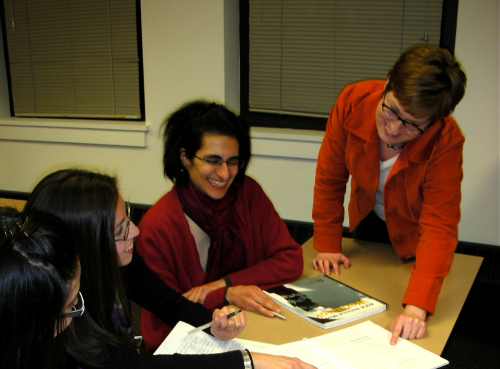Feb 05, 2010
DePaul's School of Education Program One of The Top Providers of School Counselors in Illinois
DePaul's School of Education Program One of The Top Providers of School Counselors in Illinois
DePaul University’s graduate school counseling program is making a name for itself by preparing students not only to counsel students, but to serve as leaders and student advocates.
The School of Education’s graduate counseling program is currently the third-largest counseling program in Illinois and one of the most sought-after master’s programs at DePaul. School counseling is the largest of the program’s three tracks, which also include community counseling and college student development.
The number of applicants seeking admission to the program has grown 39 percent since 2004. This increase has outpaced all but four other graduate programs at DePaul, making it one of the most popular master’s programs at DePaul.
“Just like DePaul’s mission, we have a focus on serving marginalized populations and social justice,” said Melissa Ockerman, assistant professor in the School of Education who oversees the school counseling track. She noted that the program prepares students and schools to tackle issues like bullying, test anxiety, eating disorders and anger management, among others. “School counselors need to think critically and creatively about these issues and create systemic interventions to help students succeed.”
Joyce Brown, director of secondary school counselors at Chicago Public Schools, said she asks for a list of graduates from DePaul’s program so she can recommend them to her high school principals.
“DePaul’s school counseling program has a history of producing ‘counselor-ready’ graduates who understand how to implement the American School Counselor Association’s (ASCA) National Counseling Model and use data to promote student advocacy and counselor leadership within our large urban district,” Brown said. “These skills ensure that counselors enter our schools with the skills and knowledge needed to address the achievement gap and support student success.”
DePaul’s school counseling program follows the ASCA National Model and the Education Trust’s National Transforming School Counseling (TSC) Initiative. To date, it is the only Illinois school counseling program in the process of becoming an official TSC companion institute, thus bringing national recognition to DePaul’s program.
Ockerman in part attributed increased enrollment in the school counseling program to the Illinois State Board of Education’s decision in 2004 to eliminate a requirement that school counselors have classroom experience, making many more people eligible to become school counselors.
Ockerman said the school counseling program changed its approach and curriculum to the TSC model in 2006 to better prepare school counselors to serve as advocates and agents of change for students and schools.
“It moves the school counseling profession from what had traditionally been seen as an ancillary role into a central, activist, leadership and advocacy-centered profession,” Ockerman said. “What we do and how we train our school counselors is qualitatively different because we believe in these competencies, and we build our curriculum, assignments and class discussions around them to help students understand systemic change and how they can be pivotal in the lives of their students and communities.”
As part of their graduate work, students in the program partner with Chicago-area kindergarten through 12th grade schools and conduct needs assessments, measuring the academic, career or personal/social needs of students. They then analyze the data and create interventions based on the ASCA National Model and TSC Initiative. Students also present their research and findings at state, national and professional conferences so they learn how to explain and discuss their cases and the reasons behind their recommendations.
“They’re finding that when they go into their positions after they graduate they’re already ahead of the curve,” said Erin Mason, an assistant professor in the program. “They’re showing up as brand-new school counselors with distinct knowledge and skills that their veteran counterparts were never trained in. So they’re really in a position to lead.”
Mason said five out of six of her interns last year got jobs once they graduated.
Student Nilufar Rezai said she is pleased with the program. “The material that I am learning is not only interesting, but also on the forefront of current research and policy, which makes me confident and prepared to enter the field of school counseling,” she said. “I am grateful for the opportunity to be at DePaul and am excited about my career choice having received such a top-notch education.”
Faculty members in the school counselor program have all been practitioners in the field and bring real-world experience to the classroom. Ockerman and Mason also have given presentations nationwide on best practices in school counseling and school counselor preparation. In 2009, Mason won the American Counseling Association Carl D. Perkins Government Relations Award for her advocacy work with Georgia’s state legislature on school counseling policy.
“I tell my students that school counselors can change the world. If they don’t believe that to be true, then they should withdraw from the program,” Ockerman said. “We have enough mediocre school counselors in our school systems. DePaul’s program is predicated on producing school counselors who are leaders and advocates for their students, schools and communities. So if that’s your passion, you’ve come to the right place.”
DePaul’s School of Education is one of the largest schools of education in Illinois. For more information about the school counseling program, please contact Ockerman at (773) 325-8646 or mockerma@depaul.edu.

Asst. Professor Erin Mason talks to Nilufar Rezai and two other students
